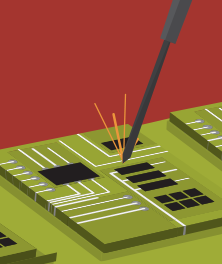Contact Information

- Division
- Business and Technology
- Dean
- Amy Schulz
- Associate Deans
- Jill Alcorn, Vance Klinke

- Division Office
- B 3, Rocklin Campus
Overview
Mechatronics is the study of electronics, mechanics and computer control in one cohesive hands-on, project-based program. The field of Mechatronics includes robotics, industrial automation, industrial process control and electro-mechanical systems. Mechatronics systems include ATMs and copy machines, elevators, medical diagnostic equipment, automated package handling, ski lifts, water processing facilities, industrial robots and large-scale food and beverage manufacturing. There are associate degree and certificate options. More information can be found at the Sierra College Mechatronics Department website: http://www.realskillsrealjobs.com.
Faculty
Robert Fosselman
Assistant Professor, Mechatronics
A.S., Sierra College
Roy Ingram
Professor, Mechatronics
A.S., Sierra College
Tony J. Osladil
Professor, Mechatronics
B.S.E.E., University of Detroit Mercy
Mechatronics Industry Advisory Committee
- Aqua Sierra Controls Inc., Auburn, CA
- Bowe Systec
- Del Oro High School, Loomis, CA
- Electrical Design and Motor Control Inc., Roseville, CA
- Harris & Bruno, Roseville, CA
- Kratos Defense Systems, Folsom, CA
- Patterson Dental, Roseville, CA
- Pride Industries, Sacramento County, CA
- Sacramento County Utilities, Sacramento County, CA
- Sierra Pacific Industries, Lincoln, CA
- Sunsweet Growers Inc., Yuba City, CA
- Tesco Controls, Sacramento, CA
- Tomra Sorting Solutions, West Sacramento, CA
- Vacuum Process Engineering Inc., Sacramento, CA
- Vision Service Plan, Rancho Cordova, CA
Degrees/Certificates
Associate Degree
Certificate of Achievement
Skills Certificate
Mechatronics Technology
AA or AS Degree
Successful completion of the curriculum in Mechatronics Technology prepares students for positions in businesses and industries that manufacture, utilize, or repair equipment incorporating electronics, mechanics, pneumatics, hydraulics and programming. For the degree, students must fulfill the following major requirements with grades of “C” or better, complete a minimum of 60 degree-applicable semester units (12 of which must be completed at Sierra College) with a grade point average of at least 2.0 and complete one of the following three general education patterns:
- Sierra College Associate Degree Requirements;
- California State University General Education Breadth pattern;
- Intersegmental General Education Transfer Curriculum (IGETC).
Required Courses
| Code | Title | Units |
|---|---|---|
| ADVM 0003D | Design for Additive Manufacturing - 3D Printing | 3 |
| MECH 0004 | Fundamentals of Mechatronics | 4 |
| MECH 0010 | Fundamentals of Electronics | 4 |
| MECH 0014 | Fabrication Techniques | 2 |
| MECH 0025 | Computers for Robotics and Automation | 4 |
| MECH 0044 | Mechatronic Processes and Materials | 2 |
| MECH 0054 | Mechatronics Systems | 4 |
| MECH 0090 | Microcontroller Embedded Systems | 4 |
| Total Units | 27 | |
Mechatronics Technology
Certificate of Achievement
Successful completion of the curriculum in Mechatronics Technology prepares students for positions in businesses and industries that manufacture, utilize, or repair equipment incorporating electronics, mechanics, pneumatics, hydraulics and programming. A certificate is designed to provide career technical skills; it is not equivalent to an associate degree.
Required Courses
| Code | Title | Units |
|---|---|---|
| ADVM 0003D | Design for Additive Manufacturing - 3D Printing | 3 |
| MECH 0004 | Fundamentals of Mechatronics | 4 |
| MECH 0010 | Fundamentals of Electronics | 4 |
| MECH 0014 | Fabrication Techniques | 2 |
| MECH 0025 | Computers for Robotics and Automation | 4 |
| MECH 0044 | Mechatronic Processes and Materials | 2 |
| MECH 0054 | Mechatronics Systems | 4 |
| MECH 0090 | Microcontroller Embedded Systems | 4 |
| Total Units | 27 | |
Electro-Mechanical
Skills Certificate
Completion of the skills certificate provides students with the underlying principles and hands-on techniques of basic electronics and basic mechanics, thereby preparing them for entry-level electro-mechanical technician positions. Emphasis is on use of electronic test equipment for troubleshooting as well as tools and processes of manufacturing as applied to industrial materials. A skills certificate is designed to provide career technical skills; it is not equivalent to an associate degree.
Required Courses
| Code | Title | Units |
|---|---|---|
| MECH 0001 | The Science of Electronics | 3 |
| MECH 0010 | Fundamentals of Electronics | 4 |
| MECH 0044 | Mechatronic Processes and Materials | 2 |
| Total Units | 9 | |
Courses
Understanding course descriptions
MECH 0001. The Science of Electronics
Units: 3
Formerly known as CIE 1
Hours: 54 lecture
Survey of electronics technology presented in the context of the principles of science. Application of the scientific method to topics ranging from basic circuits to microprocessors, including electronic music, robotics, electric vehicles, fiber optics, semiconductors, and medical imaging. Scientific, historical, political, and economic connections to electronics technology. (CSU)
MECH 0004. Fundamentals of Mechatronics
Units: 4
Formerly known as CIE 4
Hours: 108 (54 lecture, 54 laboratory)
Introduction to mechatronics, which combines electronics, mechanics, pneumatics, and hydraulics, under computer control; as applied to robotics and automation. Presented through hands-on, project-based experiments that demonstrate industrial applications. (CSU)
MECH 0008. Introduction to Electronics
Units: 3
Formerly known as CIE 8
Hours: 54 lecture
General principles, concepts, terminology, and applications of electronics in the context of mechatronics technology. (CSU)
MECH 0010. Fundamentals of Electronics
Units: 4
Formerly known as CIE 10
Advisory: Concurrent enrollment in MECH 14
Hours: 126 (54 lecture, 72 laboratory)
A fundamental study of electronic devices, circuits, and systems as applied to robotics, computers and industrial automation. Presented through hands-on, project-based experiments. (CSU)
MECH 0014. Fabrication Techniques
Units: 2
Formerly known as CIE 14
Advisory: Concurrent enrollment in MECH 10
Hours: 72 (18 lecture, 54 laboratory)
Introductory course covering the function and construction of electronic projects and equipment. Includes design and fabrication of enclosures, single and double-sided printed circuit boards, safe use of power and hand tools, through-hole, point-to-point and surface-mount soldering, rework techniques, and wiring. Research component vendors and develop a spreadsheet-based Bill Of Materials. (CSU)
MECH 0025. Computers for Robotics and Automation
Units: 4
Formerly known as CIE 25/CIS 25/CST 25
Hours: 108 (54 lecture, 54 laboratory)
Concentrated study of computer hardware and software as applied to industrial automation and robotics. Includes hardware and software installation, configuration, upgrading, diagnostics, troubleshooting, and repair. Topics include communication protocols, basic input/output system (BIOS), power-on self test (POST) procedures, disk operating system (DOS), Windows, Linux, and local area network (LAN) fundamentals. Industrial applications include data acquisition, and robotic control. (CSU)
MECH 0028. Independent Study
Units: 1-3
Formerly known as CIE 28
Hours: 54 laboratory hours per unit
Designed for students interested in furthering their knowledge at an independent study level in an area where no specific curriculum offering is currently available. Independent study might include, but is not limited to, research papers, special subject area projects, and research projects. See Independent Study page in catalog. (CSU)
MECH 0044. Mechatronic Processes and Materials
Units: 2
Formerly known as CIE 44
Hours: 72 (18 lecture, 54 laboratory)
Application of tools and materials required for design, installation and repair of mechatronic systems. Each student fabricates a final project applying system-based mechatronic principles and skills. (CSU)
MECH 0054. Mechatronics Systems
Units: 4
Formerly known as CIE 54
Prerequisite: Completion of MECH 4 with grade of "C" or better
Hours: 108 (54 lecture, 54 laboratory)
Full integration of mechatronic principles into complete closed-loop systems such as automated production equipment and industrial robots. Topics include sensors, optical encoders, analog-to-digital and digital-to-analog conversion, closed-loop AC and DC motor control, hydraulic power concepts, hydraulic motors, pneumatic and hydraulic valves and actuators and fluid power computer simulation tools. (CSU)
MECH 0090. Microcontroller Embedded Systems
Units: 4
Formerly known as CIE 90
Prerequisite: Completion of MECH 10 and MECH 14 with grades of "C" or better
Hours: 108 (54 lecture, 54 laboratory)
Study of microcontroller based embedded systems using industry standard hardware and development software. Topics and laboratory exercises covering system architecture, applications of embedded systems, real world interfacing, software development, test and troubleshooting techniques. (CSU)
MECH 0095. Internship in Mechatronics
Units: 0.5-4
Formerly known as CIE 95
Designed for advanced students to work in an area related to their educational or occupational goal. Provides new on-the-job technical training under the direction of a worksite supervisor, allowing students to expand knowledge and skills in the chosen field. Mandatory orientation session and faculty approval to determine eligibility. One unit of credit is equal to each 60 hours of non-paid work, or each 75 hours of paid work. Students may earn up to a total of 16 units in internship courses (any course numbered 95 and PDEV 94). (CSU-with unit limitation)
Program Student Learning Outcomes (PSLOs)
- Analyze pneumatic/hydraulic and VFD/electric-motor control diagrams and construct them with appropriate hardware.
- Analyze, construct and test electrical and electronic circuits from schematic diagrams.
- Fabricate and assemble mechanical assemblies from technical drawings using hand and machine tools.
- Analyze, construct and test automated systems including electronic sensors, mechanical actuators and computer control.
- Demonstrate the ability to create PLCs and microcontroller programs and properly interface them to input and output devices.



